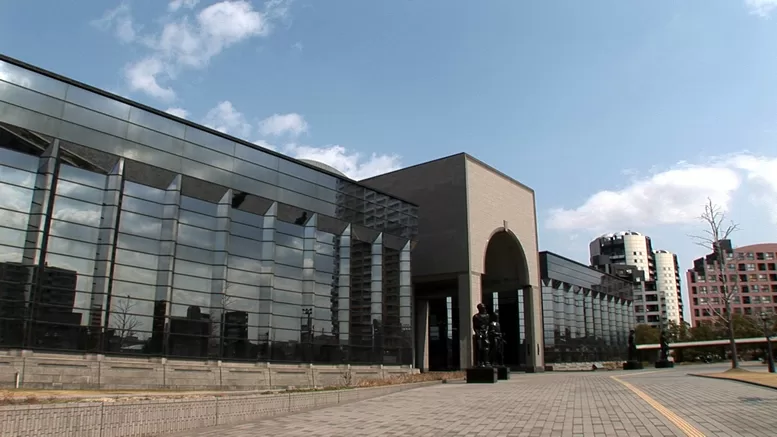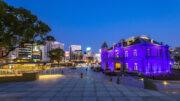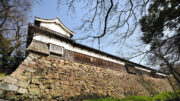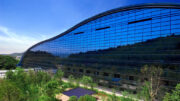 Located in the heart of Fukuoka, the Fukuoka City Museum offers visitors a deep dive into the rich history and cultural heritage of Fukuoka and the broader Kyushu region. Since its opening in 1990, the museum has served as a vital resource for both locals and tourists, providing insight into the city’s past, its role as a cultural crossroads, and its evolution into the vibrant metropolis it is today. With its wide array of exhibits, interactive displays, and educational programs, the Fukuoka City Museum is a must-visit destination for anyone interested in the history and culture of this fascinating region.
Located in the heart of Fukuoka, the Fukuoka City Museum offers visitors a deep dive into the rich history and cultural heritage of Fukuoka and the broader Kyushu region. Since its opening in 1990, the museum has served as a vital resource for both locals and tourists, providing insight into the city’s past, its role as a cultural crossroads, and its evolution into the vibrant metropolis it is today. With its wide array of exhibits, interactive displays, and educational programs, the Fukuoka City Museum is a must-visit destination for anyone interested in the history and culture of this fascinating region.
Permanent Exhibits: Exploring Fukuoka’s Past
The museum’s permanent exhibits are divided into several sections, each focusing on a different aspect of Fukuoka’s history and culture. At the heart of these exhibits is the “Fukuoka City: From Ancient Times to the Present” display, which traces the development of the city from its early days as a regional hub in ancient times to its emergence as a modern city.
One of the most notable artifacts in the museum’s collection is the Gold Seal, a National Treasure of Japan. This small but incredibly significant object was discovered in Fukuoka in 1784 and dates back to the year 57 AD. The seal, believed to have been given by the Chinese Emperor Guangwu to a local Japanese ruler, is a symbol of Fukuoka’s historical connections with China and serves as a fascinating link to the ancient history of the region. The display of the Gold Seal is accompanied by detailed explanations and reconstructions, providing context and insight into its historical significance.
Another highlight is the section dedicated to the Mongol Invasions of Japan in the 13th century. Fukuoka, then known as Hakata, was one of the key battlefields during these invasions, and the museum’s exhibits include artifacts from this period, such as weapons, armor, and ship remnants. Visitors can also learn about the legendary Kamikaze (divine wind) that is said to have thwarted the Mongol fleets, shaping the course of Japanese history.
The museum also delves into the Edo period, when Fukuoka was a thriving castle town, and the Meiji Restoration, which saw the city transform into a modern industrial center. Exhibits include traditional crafts, textiles, and historical documents, offering a comprehensive look at Fukuoka’s cultural evolution.
Special Exhibitions and Cultural Events
In addition to its permanent collection, the Fukuoka City Museum hosts a variety of special exhibitions throughout the year. These exhibitions often focus on specific themes related to Fukuoka, Kyushu, or broader Japanese culture. Past exhibitions have covered topics such as samurai armor, traditional Japanese festivals, and the cultural exchanges between Japan and Southeast Asia.
The museum is also a hub for cultural events and educational programs. Regular workshops and lectures are offered on topics ranging from traditional crafts to contemporary art, providing visitors with opportunities to engage more deeply with the museum’s collections. The museum’s children’s programs are particularly popular, offering hands-on activities that make history and culture accessible and fun for younger audiences.
The Museum Building and Surroundings
The Fukuoka City Museum itself is a striking piece of modern architecture, designed by the renowned architect Kisho Kurokawa. The building’s sleek, futuristic design contrasts beautifully with the historical exhibits housed within, symbolizing the city’s blend of tradition and modernity. The museum’s spacious interior, flooded with natural light, provides a welcoming and comfortable environment for exploring the exhibits.
Surrounding the museum is the Seaside Momochi area, a vibrant waterfront district that offers plenty of attractions for visitors. Just a short walk from the museum is Fukuoka Tower, Japan’s tallest seaside tower, which offers panoramic views of the city and Hakata Bay. The nearby Momochi Seaside Park is a popular spot for relaxing by the beach, and the area is dotted with cafes, restaurants, and shopping centers, making it easy to spend an entire day exploring.
Access Information
The Fukuoka City Museum is conveniently located and easily accessible from various parts of Fukuoka:
- From Hakata Station: Take the Kuko Line (Airport Line) to Nishijin Station. From there, it’s a 15-minute walk to the museum, or you can take a short bus ride.
- By Bus: Several bus routes from Tenjin, Hakata, and other parts of the city stop near the museum. The closest bus stop is “Fukuoka-shi Hakubutsukan Minami-guchi.”
- By Car: The museum is about a 20-minute drive from central Fukuoka. Parking is available on-site for visitors.




